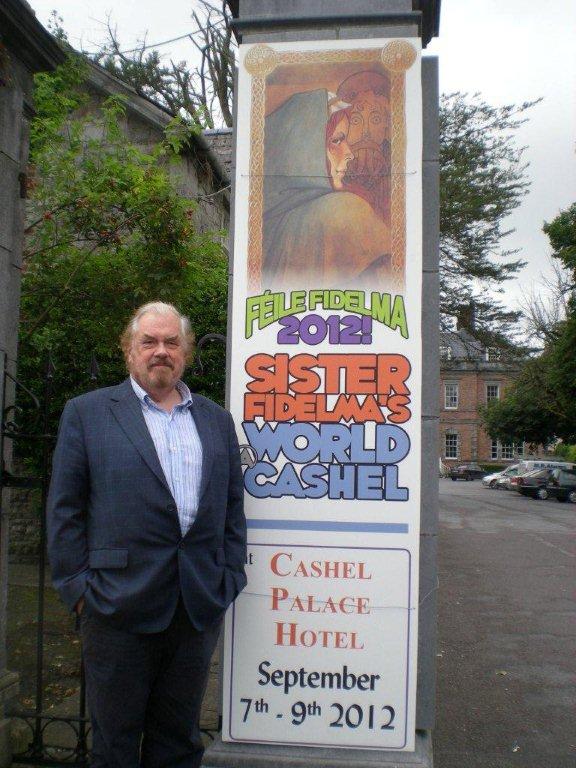Biography of Peter Berresford Ellis

Peter Berresford Ellis, Celtic historian and novelist, author of the international bestselling Sister Fidelma historical mysteries under his pseudonym of Peter Tremayne, became a prominent advocate of Pan-Celticism in the 1960s. He joined the Celtic League in 1966. Born in Coventry, Warwickshire, in 1943, he was the son of an Irish journalist. While his mother's paternal family were an old English one, her mother was of a Breton family. "With Irish, Breton, Welsh and Scots uncles and aunts as well as the English, what else could I do but be interested in the Celts?" he has often quipped.
Leaving College Peter went into journalism, and eventually helped Brendan Mac Lua (1935-2009) launch the Irish Post newspaper in Britain in 1970. Peter was deputy editor. He later became editor of weekly magazine in London before returning to higher education. As well as a first class honours degree in Celtic Studies, a master's degree in the same subject, he was elected a Fellow of the Royal Society of Antiquaries of Ireland, a Fellow of the Royal Historical Society. In 1987 he received an Irish Post Award in recognition of his work.
The same year was inaugurated a Bard of the Cornish Gorsedd mainly for his ground breaking work The Cornish Language and its Literature (Routledge, Kegan Paul, 1974) which was used for many years as a text book for the Cornish Language Board. He took the Bardic name of Gwas-an-Geltyon (Servant of the Celts).
In 1988 he was made in Honorary Life President of the Scottish 1820 Society, a society dedicated to researching and commemorating Scotland’s last major uprising. Peter and the journalist, author and activist Seumas Mac a' Ghobhainn (1930-1987) wrote the only definitive account of the uprising first published in 1970.
In 2002 Peter was awarded an Honorary Life membership of the Irish Literary Society founded in 1892 (whose president was then Nobel Literary Laureate Seamus Heaney).
In 2004 the Mayor and Town Council of Cashel, Co. Tipperary, gave him a civic reception and presentation for his Sister Fidelma books in acknowledgment of the tourism that his series had brought to the town. There is even a Sister Fidelma Guesthouse in the town’s centre.
His work was acknowledged with a Doctorate of Literature (honoris causa) by the University of East London in 2006.
Among other awards, he received the French Prix Historia for the best historical novel of 2010, Maitre des âmes (Master of Souls), a Sister Fidelma Mystery.
As a Pan-Celticist, becoming active in the Celtic League, he won some notoriety with his polemic pamphlet The Creed of the Celtic Revolution in 1969. At the 1969 Celtic League AGM in Dublin, he was appointed to chair a media group within the League to work on better ways to publicise and educate people on Celtic subjects. As part of that, he and other leading Pan Celts formed a company called The New Celt Ltd aiming to launch a regular professional Pan Celtic publication. However, finances were scarce and the proposal was abandoned. However, The Celtic League finally able to change their duplicated newsletters and create a professional quarterly Carn launched in 1973. Peter served in various offices at branch level and from 1988-1990 was elected convenor (chairman) of The Celtic League.
In 1985 he was appointed organising chairman of Scríf-Celt – the first Celtic languages book fair. He was re-elected to the role in 1986. In 1989 he was also elected organising chairman of the London Association for Celtic Education, becoming its president from 1990-92.
Books such as The Celtic Revolution (Y Lolfa, 1985), which went to many editions, and The Celtic Dawn: A History of Pan Celticism (first published by Constable, 1993, and reissued by Y Lolfa in 2002), became fundamental texts of Pan-Celticism.
Under his own name he has published 34 books covering many aspects of Celtic history and culture. As Peter Tremayne, he has also published over 50 novels and over 90 short stories. He has the interesting distinction of having his fictional stories published in every Celtic language bar one – Welsh. The Welsh author, Gwyn Griffiths, is currently seeking to remedy this.
His 7th Century based Irish Sister Fidelma Mysteries have appeared in 18 languages and in 2002 The International Sister Fidelma Society was established in the USA, with a membership in over a dozen countries. It not only runs a website (www.sisterfidelma.com) but issues a 20 page full colour magazine entitled The Brehon available in print and electronic form. An international three day fan gathering, the Féile Fidelma, has been held in Cashel, Co. Tipperary, Ireland, since 2006.
Last year an academic study was published by McFarland in the US entitled The Sister Fidelma Mysteries: Essays on the Historical Novels of Peter Tremayne. This was edited by Professor Ed Rielly and David Wooten.
Peter Berresford Ellis kindly provided this biography to accompany his interview.
- Pan-Celtic
- English





